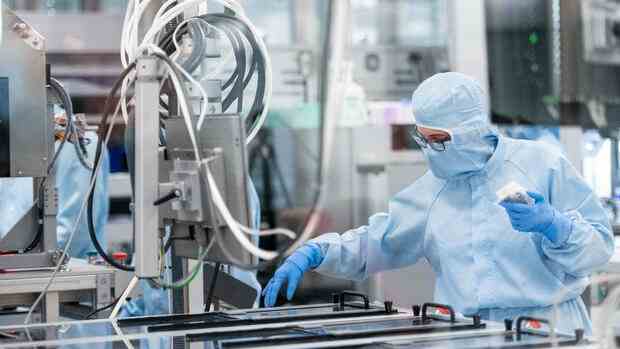Frankfurt Normality is returning to the diagnostics industry after the Corona boom. The providers’ growth forecasts are much more sober. The Dax group Qiagen is no exception, as the figures presented on Wednesday show.
The laboratory service provider is preparing for “a significant decline in sales of Covid 19 products compared to 2022”. The core business is likely to see double-digit percentage growth this year, calculated at constant exchange rates. But that will not compensate for the losses in pandemic-related products in the current year, expects CFO Roland Sackers. Their sales were $470 million in 2022, and $200 to $210 million are expected.
During the pandemic, Qiagen has not only benefited from the demand for tests and analysis devices. The need for materials needed to prepare the samples was also greatly increased. Overall, the Hilden-based company is expecting currency-adjusted sales of $2.05 billion this year, which corresponds to a decline of around nine percent. Adjusted diluted (subject to subscription rights) earnings per share is expected to be at least $2.10. That would reduce it by almost 12 percent.
Qiagen share price rises more than 1.5 percent
With a view to Qiagen, the markets had basically already adjusted to declining sales. So they reacted positively to the numbers on Wednesday, the share price of the Dax group rose by more than 1.5 percent by noon.
In the past fiscal year, Qiagen’s sales fell by five percent to $ 2.14 billion after two strong years of corona. Excluding exchange rate effects, sales remained stable. The bottom line is that profits fell by almost a fifth to 423 million dollars. Overall, however, the 2022 financial year went much better than management had expected a year ago. Qiagen had raised its forecast three times over the course of the year.
After the sometimes high double-digit jumps in sales and earnings of the diagnostics providers in 2021, the industry delivered a mixed picture last year. While the manufacturers posted increasing sales, especially in the business with the antigen rapid tests, the PCR test business, i.e. the detection of the virus in the laboratory, declined compared to the strong previous year.
Siemens Healthineers, for example, had reached its peak with its Covid 19 diagnostics in the 2022 fiscal year: Sales of rapid antigen tests rose from 1.1 to 1.55 billion euros, which brought the company 620 million euros in profit after taxes. After this success, Siemens Healthineers no longer expects large sales of rapid antigen tests in the current fiscal year.
Erlangen’s diagnostics division is not as strong as that of its competitors. The business beyond the Covid 19 rapid tests had even shrunk recently. With a conversion and the reduction of analysis platforms, the division is to be brought back on course and 300 million euros are to be saved.
Roche is optimistic about the business
Siemens had built up its diagnostics division years ago through acquisitions worth billions. However, since the business areas beyond diagnostics are doing well at Healthineers, the group expects comparable sales growth of between six and eight percent and an increase in earnings per share of between 13 and 24 percent in the current financial year – excluding rapid tests.
The outgoing Roche boss Severin Schwan had also prepared investors last week for falling sales in the single-digit percentage range at the pharmaceutical and diagnostics company. Because the entire pandemic-related sales of the group will fall by five billion francs in the current financial year, Schwan expects. If sales in connection with corona products are excluded from the forecast, Roche expects solid sales growth for this year in both the pharmaceuticals and diagnostics businesses.
Roche’s CEO has prepared shareholders for falling diagnostic sales.
(Photo: Reuters)
On the one hand, the core business is doing well: In the diagnostics division, the decline in sales of Covid 19 tests was even compensated for last year. Sales rose by three percent year-on-year to CHF 17.7 billion.
Second, the company hopes to leverage its leadership in Covid PCR testing post-pandemic. Many laboratories had increased their capacities during the pandemic with the group’s PCR test machines. These can also be used to diagnose other diseases. Last but not least, new products should boost growth, including a test that can indicate heart failure at an early stage.
>> Read also: Declining corona sales cloud the last balance sheet of the outgoing Roche boss
Qiagen CFO Roland Sackers also expects an overall positive market environment for his company. The Covid 19 pandemic has significantly increased the acceptance of diagnostics, and the products are reimbursed more quickly. The research budgets at institutes and some pharmaceutical companies have also increased. In the important Chinese market, which is currently burdened by lockdowns, Qiagen expects normalization and more growth over the course of the year.
Abbott, the world’s second largest diagnostics provider, also wants to further increase its sales beyond the Covid-19 business and is planning high single-digit sales growth. In the current year, the US group is still expecting around two billion dollars in corona-related test sales, which corresponds to almost a quarter of the sales of the past year. Overall, Abbott’s diagnostics division grew more than 10 percent in constant currency in 2022, and reported sales increased 6 percent to $16.6 billion.
More: Expansion race of the corona vaccine manufacturers
